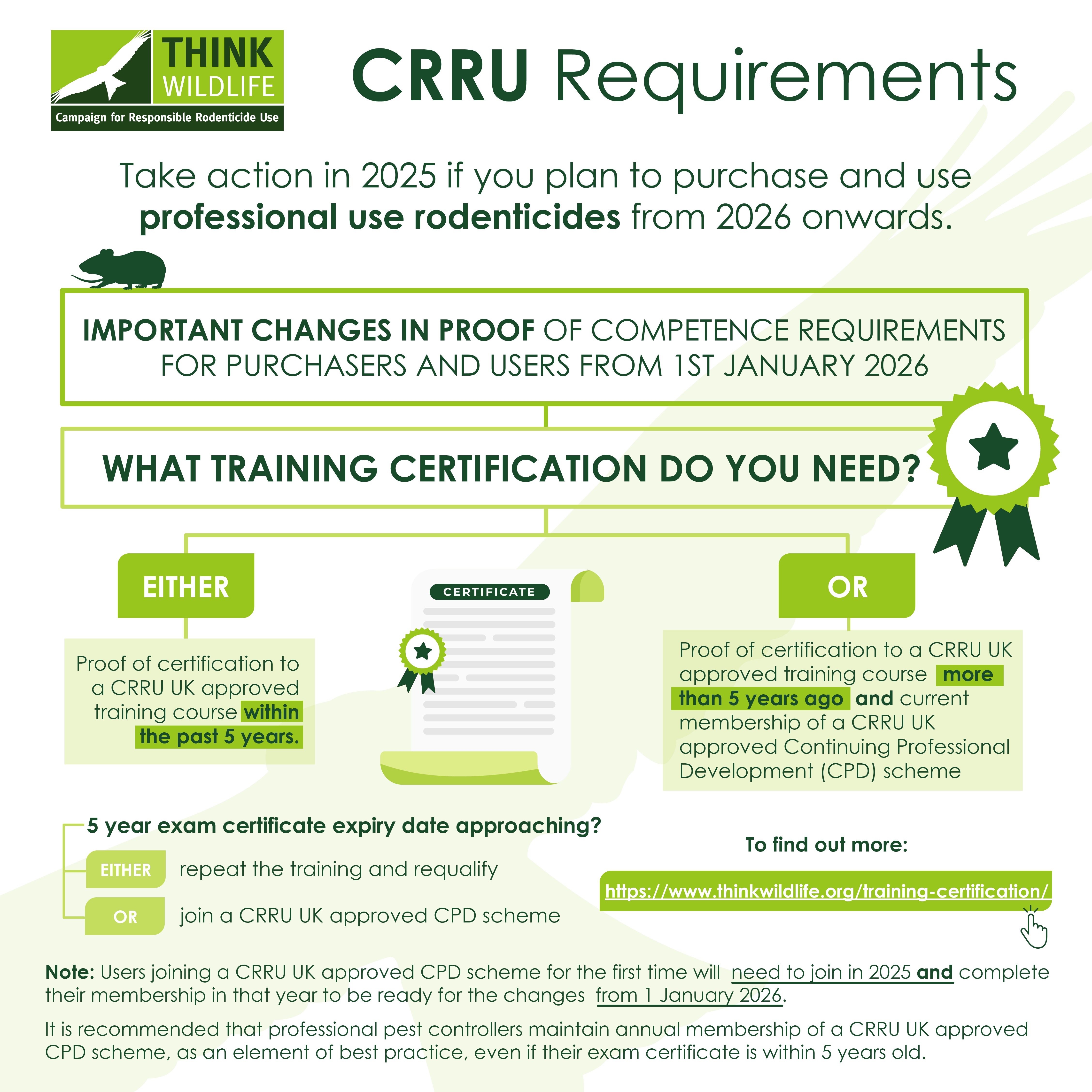
06 Nov New Q&A Guide from CRRU UK Prepares Rodenticide Users for 2026 Certification Requirements
The Campaign for Responsible Rodenticide Use (CRRU UK) has released a new Q&A document to clarify upcoming proof of competence requirements for purchasing and using professional-use rodenticides. This guide, aimed at supporting farmers, gamekeepers, and professional pest controllers, offers tailored advice to each group as they prepare for changes effective from 1st January 2026.
From 2026, sellers of professional-use rodenticides will only accept two forms of proof of competence at the point of sale. Depending on the type of user, requirements vary slightly to reflect their unique roles:
- Farmers: From 2026, existing membership in Farm Assurance Schemes alone will not qualify as proof of competence for rodenticide purchase. Farmers will need to show proof of CRRU-approved training within the last five years. Or, if certified over five years ago, join and fulfil membership criteria for a CRRU UK approved Continuing Professional Development (CPD) scheme in 2025.
- Gamekeepers: Like farmers, gamekeepers will need either recent training certification or a combination of older certification with membership of a CRRU UK approved CPD scheme.
- Professional Pest Controllers: Those who already maintain a current CRRU UK approved CPD membership and have CRRU approved training certification will meet the requirements without further action. For others, up-to-date certification or joining and fulfilling membership criteria for a CRRU UK approved Continuing Professional Development (CPD) scheme (in 2025) will be necessary by the start of 2026.
Nigel Cheeseright, CRRU UK’s Chair, said, “With the release of this Q&A document, CRRU UK aims to give rodenticide users the clarity they need to meet the upcoming requirements.
“Our mission is to support safe and effective rodent control across all professional sectors, building on the responsible practices already upheld by rodenticide users. Adhering to these new standards is essential to maintain stewardship and ensure continued access to these important products. By providing clear guidance on both CRRU-approved training and CPD options, we aim to strengthen existing practices, prevent misuse, protect the environment, and reinforce trust with regulators and the public. These updates reflect CRRU’s commitment to continual learning and sustainable rodent control, equipping users with flexible options to meet these shared responsibilities.”
Dr Matthew Davies, Head of the CRRU UK Training and Certification Work Group, added, “This is the next step in the journey to support stewardship aims – to control rodents effectively while minimising risk to non-target species and the environment. Since the inception of stewardship, standards have been raised – from introducing a CRRU UK approved list of training & certification, implementing secure exams and regulated qualifications across the board, to now require mechanisms to show up-to-date knowledge for all professional users of rodenticides. Regular training and a focus on Continuing Professional Development is the right course of action.”
Kevin Lawrenson, CEO of the National Pest Technicians Association, added, “These strengthened training requirements reflect a positive step forward for our industry. At the NPTA, we are dedicated to helping our members meet these standards smoothly, ensuring they stay well-prepared and fully equipped for responsible rodenticide use. Our close partnership with CRRU reinforces our commitment to providing pest control professionals with the necessary resources and training to operate effectively, protecting both public health and wildlife.”
The document includes practical advice on timing and course options for re-certification, tips for CPD enrolment in 2025, and FAQs specific to each group. This effort ensures that all professional rodenticide users, whether managing farms, estates, or pest control services, can make informed decisions about their training and certification needs.
For further details, access the new Q&A document and information on approved training and CPD schemes, visit https://www.thinkwildlife.org/training-certification/#cpd-scheme




